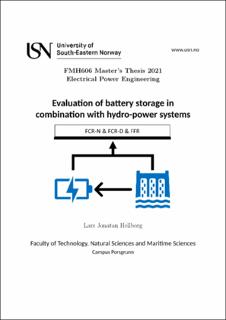Evaluation of battery storage in combination with hydro-power systems
Master thesis
Permanent lenke
https://hdl.handle.net/11250/2773843Utgivelsesdato
2021Metadata
Vis full innførselSamlinger
Sammendrag
As the power grid moves away from larger rotating masses, thereby decreasing the inertia and
making the grid more sensitive to production changes, it becomes more and more important
that new and improved power reserves are implemented.
Battery storage systems are a great tool for providing the ancillary services that are required
in order to ensure the stability of the grid- but, they do suffer from a flaw in that they are
limited. This flaw can, as is shown in this thesis, be mitigated by installing the battery energy
storage in connection with hydro-power units and allowing them to increase production to
offset the battery output if the frequency deviation persists. This Thesis contains a technical
study which details the various parts of this type of hybrid system as well as discussing the
various benefits and future scenarios. Furthermore, it contains an evaluation of the work
done by Uniper, which also serve as the foundation of this Thesis.
The evaluation of installed units at Lövön clearly shows that the technical requirements, as
stipulated by SVK in conjunction with the rest of the Nordic TSOs, are fulfilled. Furthermore,
while the developed models are not an exact replica of the installed units, they do
exhibit the same behaviour and provide realistic, verified results as well as providing a base
for future developments.
The models and simulations show that this type of hybrid system can greatly reduce the
wear and tear on the turbines, while still being able to provide the required functions.
